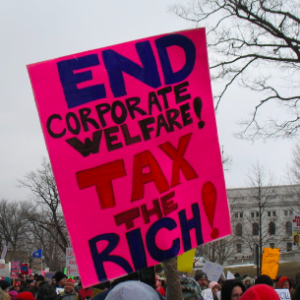For an alternate viewpoint, see “Counterpoint: High-Income Earners Pay Much More Than Their ‘Fair Share.’”
As Tax Day approaches, it’s a good time to reflect on the societal agreement that our nation funds necessary things through our tax dollars and that taxes should be progressive — placing greater obligation on those with the most ability to pay.
Unfortunately, the wealthy seldom pay their fair share. At times, it can feel like our country has two different tax systems: one for everyday people who work for their income and another for those whose money comes from investments, inherited wealth or gaming the system with a bevy of corporate tax attorneys.
Not only is the system rigged, the distribution of need in this nation underscores the unfairness. Seniors lack proper care, families face piles of medical debt, and parents struggle with unconscionable choices like buying food or life-saving medicines for their sick kids. Housing is unaffordable for many, and homelessness is getting worse. Schools are in desperate need of supplies. Even broad societal threats like accelerating and devastating climate-related catastrophes and epidemics of drug overdoses are hitting communities harder.
The yawing divide between the haves and the have-nots couldn’t be more apparent. It nags every person who hears about a billionaire paying a lower tax rate than a teacher or firefighter. When we have so much need, was it right for the richest people in the country to get a tax cut from 39.6 percent to 37 percent through the 2017 tax package?
Obviously not. Maybe if the United States taxed the rich more, we could nurture people’s success by paying for daycare so it’s easier to get ahead in the workforce.
What about the multimillionaires who pass fortunes to their heirs without being subject to the estate tax? It’s infuriating that the 2017 Trump tax giveaways doubled the threshold for estates subject to the tax. Given inflation, those estates excluded can be worth around $13 million for individuals and $25 million for couples.
Similarly, it boils one’s blood to hear about multinational corporations’ legal teams using accounting maneuvers to outsource investments and slash their tax bills, schemes bolstered by the international provisions of Trump’s 2017 tax law. Along with the domestic corporate tax rate cut from 35 percent down to 21 percent in that same tax package, Big Business got quite a gift that December.
And let’s not forget the Wall Street titans who made record profits while the rest of the country suffered a pandemic-fueled economic crisis. Stocks are overwhelmingly owned by the very wealthy. Thanks to the Inflation Reduction Act (IRA), stock buybacks are now taxed, but Wall Street still doesn’t pay a real sales tax on its stock trades (called a financial transaction tax), while everyday people shopping on Main Street pay sales tax on essential goods like soap, jackets and shoes.
Even though President Biden signed the IRA, which instituted a minimum corporate tax of 15 percent on billion-dollar companies, corporate America has a long way to go before it is paying its fair share. Luckily, the tide could be turning toward a more progressive tax code to fund investments that tackle inequality.
Biden’s State of the Union and recent 2025 budget proposal outlined changes to the tax code that would enhance fairness. These include increasing tax rates on corporations and wealthy individuals, closing loopholes that benefit mega-millionaires, and ensuring the IRS has the resources to go after tax cheats. Although Biden provided a strong vision of tax fairness, some progressive sources of revenue, like a Wall Street tax, were left off his list.
As the nation’s leaders debate tax reform fueled by expiring provisions of the 2017 tax law, we all must recommit to a shared vision to unrig our tax code and invest in American communities.





